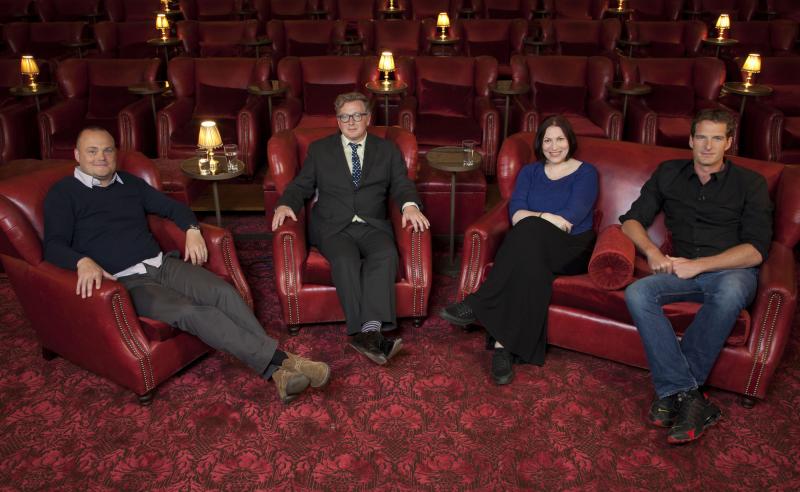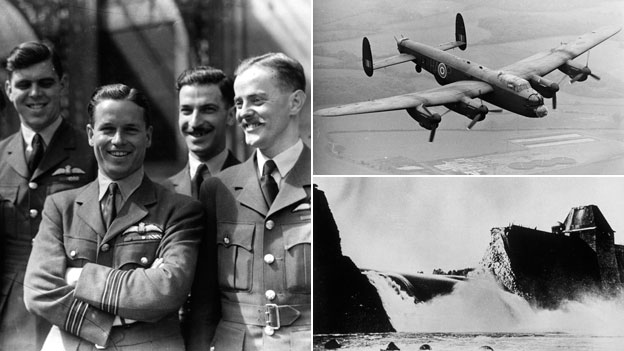Al Murray's Great British War Films, BBC Four | reviews, news & interviews
Al Murray's Great British War Films, BBC Four
Al Murray's Great British War Films, BBC Four
Military intervention might have helped spark some life into this panel chat

Fifty-seven minutes into this hour-long programme entitled "Al Murray’s Great British War Films", our host put panellist Dan Snow on the spot and asked him to name his favourite war film. “Does it have to be British?” Snow wondered. For a second it looked like Murray and his other two guests might stick him in solitary confinement for a week, yet Snow’s dizzy reaction was not only (unintentionally) funny but also gave away just how much he’d switched off by now.
For all that it promised – a comedian with a love of history and three panellists sit in lovely leather chairs and watch some smashing clips of war films while considering what it all meant – it was surprisingly dull. The pictures themselves were great. The Dam Busters (1955), Where Eagles Dare (1968), The Guns Of Navarone (1961) and The Bridge on the River Kwai (1957) were among the movies described and analysed by Murray and Snow, along with Natalie Haynes and Matthew Sweet, who did his best to inject some energy into proceedings.
It was Match of the Day for war film fans
We learned that “so many” war films were made in the 1950s. People were using these stories to find out what happened only five or 10 years before, said Sweet. Fair enough. There was a news element to it, and no better example was there than Michael Redgrave in The Dam Busters (collaged, below right), illustrating as Barnes Wallis how the bouncing bomb was created which, in 1943, had such devastating impact at the Mohne, Eder and Sorpe dams in Germany.
Other films were lightweight when it came to the truth, they argued, and some proposed questions of morality such as, who is chiefly responsible for the carnage of war? Those who do the dirty work or the men who give the orders? Class and national identity were also touched upon, leading to the point made endlessly by Murray that us Brits do a good stiff upper lip.
 In avoiding a "Hundred Greatest War Movies" format, Murray had ditched the talking heads so loved by programme makers in favour of some guests for a round table discussion (minus the table). It was Match of the Day for war film fans.
In avoiding a "Hundred Greatest War Movies" format, Murray had ditched the talking heads so loved by programme makers in favour of some guests for a round table discussion (minus the table). It was Match of the Day for war film fans.
Some clear problems emerged. The panellists were far too nice to one another. Murray – in the Gary Lineker role – didn’t wind anybody up and didn’t challenge his colleagues, so that they ended up agreeing with each other or (in Snow’s case) drifting off entirely.
Secondly, there wasn’t much in the way of evidence. While some interesting anecdotes and observations were thrown in along the way, the programme cried out for hard facts and some colour to support their opinions. It’s okay to talk about the popularity of war films in the 1950s but what does that mean? What figures exist to put this into context? What difficulties did film-makers have in terms of censorship? Sadly no voice was given to anyone involved in the making of these films or, indeed, to those who had watched them at the cinema. The programme didn’t help itself by claiming that this brand of war film is never shown anymore on British TV; well, plainly, that isn’t true.
This was such a good idea, could have been highly entertaining as well as illuminating, but one that never properly got going: thin on facts and it actually felt like the panellists had only met about 20 minutes before the cameras started to roll. A military operation it was not.
Add comment
The future of Arts Journalism
You can stop theartsdesk.com closing!
We urgently need financing to survive. Our fundraising drive has thus far raised £49,000 but we need to reach £100,000 or we will be forced to close. Please contribute here: https://gofund.me/c3f6033d
And if you can forward this information to anyone who might assist, we’d be grateful.

Subscribe to theartsdesk.com
Thank you for continuing to read our work on theartsdesk.com. For unlimited access to every article in its entirety, including our archive of more than 15,000 pieces, we're asking for £5 per month or £40 per year. We feel it's a very good deal, and hope you do too.
To take a subscription now simply click here.
And if you're looking for that extra gift for a friend or family member, why not treat them to a theartsdesk.com gift subscription?
more TV
 Murder Before Evensong, Acorn TV review - death comes to the picturesque village of Champton
The Rev Richard Coles's sleuthing cleric hits the screen
Murder Before Evensong, Acorn TV review - death comes to the picturesque village of Champton
The Rev Richard Coles's sleuthing cleric hits the screen
 Black Rabbit, Netflix review - grime and punishment in New York City
Jude Law and Jason Bateman tread the thin line between love and hate
Black Rabbit, Netflix review - grime and punishment in New York City
Jude Law and Jason Bateman tread the thin line between love and hate
 The Hack, ITV review - plodding anatomy of twin UK scandals
Jack Thorne's skill can't disguise the bagginess of his double-headed material
The Hack, ITV review - plodding anatomy of twin UK scandals
Jack Thorne's skill can't disguise the bagginess of his double-headed material
 Slow Horses, Series 5, Apple TV+ review - terror, trauma and impeccable comic timing
Jackson Lamb's band of MI5 misfits continues to fascinate and amuse
Slow Horses, Series 5, Apple TV+ review - terror, trauma and impeccable comic timing
Jackson Lamb's band of MI5 misfits continues to fascinate and amuse
 Coldwater, ITV1 review - horror and black comedy in the Highlands
Superb cast lights up David Ireland's cunning thriller
Coldwater, ITV1 review - horror and black comedy in the Highlands
Superb cast lights up David Ireland's cunning thriller
 Blu-ray: The Sweeney - Series One
Influential and entertaining 1970s police drama, handsomely restored
Blu-ray: The Sweeney - Series One
Influential and entertaining 1970s police drama, handsomely restored
 I Fought the Law, ITVX review - how an 800-year-old law was challenged and changed
Sheridan Smith's raw performance dominates ITV's new docudrama about injustice
I Fought the Law, ITVX review - how an 800-year-old law was challenged and changed
Sheridan Smith's raw performance dominates ITV's new docudrama about injustice
 The Paper, Sky Max review - a spinoff of the US Office worth waiting 20 years for
Perfectly judged recycling of the original's key elements, with a star turn at its heart
The Paper, Sky Max review - a spinoff of the US Office worth waiting 20 years for
Perfectly judged recycling of the original's key elements, with a star turn at its heart
 The Guest, BBC One review - be careful what you wish for
A terrific Eve Myles stars in addictive Welsh mystery
The Guest, BBC One review - be careful what you wish for
A terrific Eve Myles stars in addictive Welsh mystery
 theartsdesk Q&A: Suranne Jones on 'Hostage', power pants and politics
The star and producer talks about taking on the role of Prime Minister, wearing high heels and living in the public eye
theartsdesk Q&A: Suranne Jones on 'Hostage', power pants and politics
The star and producer talks about taking on the role of Prime Minister, wearing high heels and living in the public eye
 King & Conqueror, BBC One review - not many kicks in 1066
Turgid medieval drama leaves viewers in the dark
King & Conqueror, BBC One review - not many kicks in 1066
Turgid medieval drama leaves viewers in the dark
 Hostage, Netflix review - entente not-too-cordiale
Suranne Jones and Julie Delpy cross swords in confused political drama
Hostage, Netflix review - entente not-too-cordiale
Suranne Jones and Julie Delpy cross swords in confused political drama

Comments
Hello - I missed the opening
Think it must be the Electric
Think it must be the Electric Cinema on Portobello Road
In the case of Dan Snow. Do